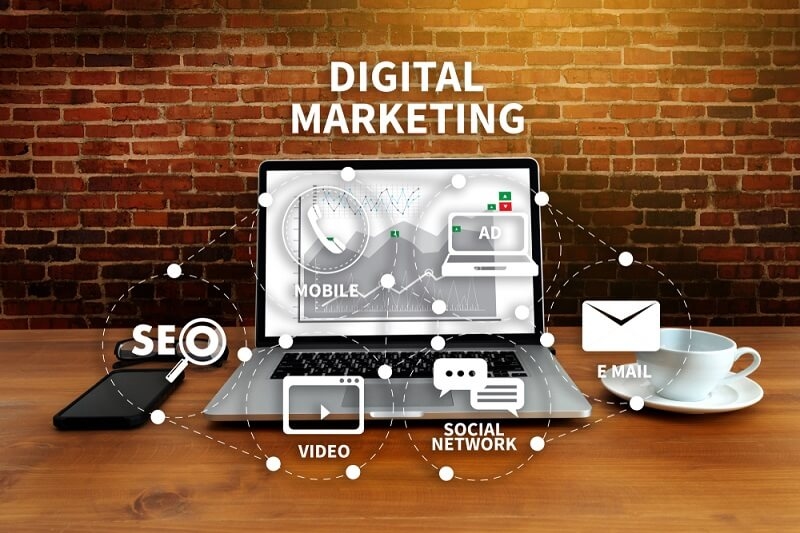
In today's fast-paced business environment, startups need more than a great idea—they need powerful digital marketing strategies to build brand visibility, attract customers, and drive sustainable growth. Implementing top digital marketing strategies early on can set your startup apart from the competition and fast-track your journey to success. From SEO to social media and content marketing, these startup marketing tips are essential tools to boost your online presence and drive real results.
If you are a founder in search of ideas for digital campaigns to drive small business success, this guide offers a tested framework. You will also discover the fundamentals of content marketing for startups and how a social media growth strategy can drive lasting results.
For startups, budgets tend to be tight, and every dollar spent needs to return a quantifiable payoff. Digital marketing provides a cost-efficient, highly targeted, and scalable way to bring in your best prospects. Unlike traditional methods, digital channels enable startups to monitor user activity, optimize campaigns, and drive ROI in real time.
Startups that invest in digital marketing strategies right from the start are likely to build credibility, reach out to customers, and stay ahead of competition in a crowded marketplace.
You need to get the fundamentals right before you dive into complicated campaigns. These startup marketing tips are going to set the foundation for your marketing strategy:
Unless you know whom you are communicating with, your message will fall on deaf ears. Leverage such tools as Google Analytics, social data, and surveys to construct buyer personas. Making your digital marketing efforts persona-aligned guarantees relevancy and improved interaction.
Your business must have a recognizable brand with uniform visuals, voice, and messaging across all digital media. This promotes trust and retention.
Your site must be fast, mobile-friendly, and conversion-optimized with clear calls to action, interactive visuals, and simple navigation.
Ensure all digital endeavors are directed towards specific, measurable, achievable, relevant, and time-bound objectives to monitor success efficiently.

Content marketing remains a cornerstone of successful digital marketing strategies. It builds brand awareness, educates prospects, and nurtures leads through every stage of the buyer journey.
Publishing high-quality, SEO-optimized blogs can attract organic traffic and position your startup as an industry thought leader. Focus on relevant topics and frequently asked questions.
Infographics, videos, and branded illustrations may increase engagement. They are extremely shareable and best suited for social networks.
Give away whitepapers, guides, or case studies to gather emails and establish a solid email list.
Writing for other relevant sites in your space can help drive referral traffic and enhance credibility.
The magic ingredient is consistency and consistently giving your audience value. Startups' content marketing isn't about selling, it's about storytelling, problem-solving, and building trust.
Search Engine Optimization, or SEO, is a long-term initiative, but an important component of any online marketing plan. You will benefit from SEO in three ways: You rank on search engines, you drive organic traffic without pay-per-click, and you build organic presence.
Find the terms that your audience is looking for. Focus on long-tail questions-sizing questions and phrases that fit into your niche.
Optimize every page and blog with titles, headers, meta descriptions, internal linking, etc. Your main keyword should be employed in your content naturally.
Verify that your website loads quickly, is responsive to mobile, and operates with secure HTTPS. Use platforms like Google Search Console to monitor for crawl errors.
The more high-quality superhero backlinks you obtain, the higher your domain authority and search ranking to customers. Reach out to bloggers, journalists, and industry partners.
If you stay true to a strong SEO marketing startup guide, you are going to have long-term visibility and less reliance on paid sources like SEM, PPC, and more.
Social media is the most powerful tool available in your startup's digital arsenal. Establishing an effective social media growth strategy will allow you to build an engaged community of followers, increase brand exposure, and ultimately, sell more products/services.
Be selective! Keep your efforts focused on the platforms where your ideal audience hangs out (i.e. LinkedIn for B2B, Instagram for promotional products/services, TikTok for audiences under 30).
Post consistently, and more importantly, respond to comments, DMs, and shares. Engagement is how we build trust, and get to know each other!
If you can learn how to use hashtags to your advantage and identify trending content, you greatly increase the chance that your content will be seen.
Even if you have a small budget for ads, paid social can be a useful way to reach target audiences, test messaging, and get conversions.
Collaborating with niche influencers can deliver highly engaged audiences for a much lower price than macro-celebs.
Your social media growth plan must be data-driven and supportive of overall brand messaging.
Conducting digital campaigns is necessary to drive your brand forward. Below are effective digital campaign strategies for small business startups:
Build sequences to onboard users, teach them about your product, and promote upgrades or referrals.
Utilize Facebook Pixel or Google Ads retargeting to re-target users who dropped by your site but didn't convert.
Utilize webinars to demonstrate your solution, address questions in real-time, and generate signups immediately.
Provide free trials, gift cards, or products to create engagement and expand your email list rapidly.
Reward happy users for referring friends. It's one of the cheapest methods for obtaining new customers.
These small business digital campaign ideas enable you to reach more people and create
qualified leads at a low cost.
From one digital marketing campaign to another, success is continual improvement. Use analytics to determine what's working (and what's not) in your digital marketing. When you're analyzing performance, look at KPIs—website traffic, conversion rate, bounce rate, customer acquisition cost, etc.
Keep an eye on user behavior and where traffic is coming from to determine what's working.
Test out ad creatives, email subject lines—they're definitely worth your time to test versions and quickly find out what's most appealing to your audience.
Monitor all relevant performance metrics, and update your strategies based on what you've learned—don't waste your time on things that don't work.
Every startup that exists today owes a large part of its pace of growth to smart, scalable digital marketing initiatives. By identifying content to be audience-centric, focusing on the basics of search engine optimization, putting our targeted start-up marketing strategies into practice, and implementing a strategic social growth plan, your startup will likely grow faster than others.
The secret is not doing it all; it's doing the right things with a deliberate, data-driven approach. Bring the items mentioned above to reality, track back to them regularly, and watch your startup come to life from what was once only an idea.
This content was created by AI